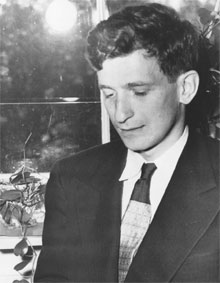
Bohm
David Joseph Bohm (20 Dec 1917 – 27 Oct 1992) was the first to offer a comprehensive realist alternative to conventional quantum mechanics, eliminating entirely any special role for ‘the observer’ in the statement of the theory. His papers of 1952 on what he then called a ‘hidden-variable’ quantum theory (later ‘causal’ quantum theory) inspired investigations into quantum non-locality by John Bell some ten years later and stimulated much of the resurgence of interest in quantum foundations in the last quarter of the 20th century. Although similar ideas had been presented by Louis de Broglie at the Solvay Conference of 1927, de Broglie did not recognize that his theory, which he called ‘pilot-wave theory’, was complete as it stood and required no further mechanism for wave-packet collapse. In this sense Bohm was the first to solve the problem of measurement in quantum mechanics.
Bohm himself did not see the theory as a final solution to the interpretative problems of quantum mechanics, however, and devoted many of his later years, in collaboration with Basil Hiley, to the idea of an ‘implicate order’ and to the view that information could become ‘active’ in ordinary matter. In this way he sought to develop a new understanding of the mind-body problem. Their collaboration led to the posthumously published The Undivided Universe: An ontological interpretation of quantum theory (1993).
Bohm was born in Wilkes-Barre, Pennsylvania, to Jewish immigrants. He graduated from Pennsylvania State College in 1939 and obtained a doctorate in physics from the theoretical physics group at the University of California at Berkeley, working under Oppenheimer’s direction. Owing to his earlier association with the Young Communist League and his opposition to subscription he was prevented from joining Oppenheimer at Los Alamos. After the war, on becoming Assistant Professor of Physics at Princeton, he was called to testify before the House Un-American Activities Committee. On pleading the 5th amendment he was dismissed from his position at Princeton. When his U. S. passport was withheld on entering Brazil, to take up a position at Sao Paolo University in 1951, he opted for Brazilian citizenship. When he subsequently moved to the United Kingdom in 1957 he became a British national. From 1961 to his retirement in 1987 he was Professor of Theoretical Physics at Birkbeck College, London.
